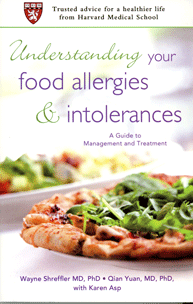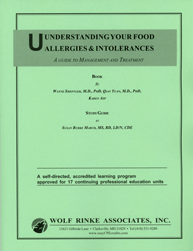|
|
|
||||||||||
|
CPE Home Page List of All Courses/Programs
Share a Program: Order Form FREE:Read & Grow Rich
|
|||||||||||
Understanding Your Food Allergies & Intolerances
Book, 245 pgs and Study Guide with 1 Reporting Form, 32 pgs.
For more information and customer comments, click here. For RDs/RDNs & DTRs/NDTRs for the Professional Development
Portfolio
Share with a friend and Save! Click here for important information about
sharing.
Understanding Your Food Allergies & Intolerances ©2013 Wolf Rinke Associates. No part of this publication may be reproduced, stored in a retrieval system, or transmitted in any form or by any means, electronic, mechanical, photocopying, recording, scanning, or otherwise, without the prior written permission of the Publisher. CUSTOMER COMMENTS Amy Reilly: I think this book provided a lot of useful information, especially now that allergies and intolerances have become so common. It also hits very close to home for me, since one of my daughters does have nut allergies. Very well written and informative. Kristine Kettler: I really enjoyed learning the specific differences between an allergy and an intollerance. I was especially interested in peanut allergies since my son has a severe allergy." INTRODUCTION AND OVERVIEW Welcome to Understanding Your Food Allergies & Food Intolerances aself-directed accredited learning program. This program consists of a book of the same title and this study guide. This program will provide you with useful information about food allergies and sensitivities that will enable you to guide your patients and students toward practical nutrition strategies for coping with food sensitivities. It is also intended to help you earn 17 CPEUs. To get the most out of this self-directed accredited learning program, it is suggested that you adhere to the following four steps: After you have successfully completed the program, complete the CPE REPORTING FORM and: We will email your Certificate of Completion. When you submit your CPE Reporting Form to us via www.easyCPEcredits.com, fax or mail, be sure to write your correct email address in the space provided on the CPE Reporting Form. If writing by hand, be sure to print your email address clearly. To ensure that our email s are delivered to your inbox (instead of your junk/spam folders), please add cpesupport@wolfrinke.com to your Address Book or Safe List of allowed email senders. Also, be sure to allow attachments from this email address. Enjoy Understanding Your Food Allergies & Food Intolerances! Susan Burke March, MS, RD, LD/N, CDE, author of Making Weight Control Second Nature: Living Thin Naturally. GOAL AND OBJECTIVES
Goal: To provide you with useful information about food allergies and sensitivities that will enable you to guide your patients, clients, and students toward practical nutrition strategies for coping with food sensitivities. Objectives: Upon completion of this accredited, self-directed learning program you will be better able to:
TABLE OF CONTENTS Part I: Understanding food sensitivities ABOUT THE AUTHORS OF THE BOOK Wayne Shreffler, MD, PhD, specializes in allergy and immunology and is a pediatrician and the director of the Food Allergy Center and section chief in Pediatric Allergy/Immunology at Massachusetts General Hospital in Boston. Qian Yuan, MD, PhD, specializes in pediatric gastroenterology and nutrition and is the clinical director of the Food Allergy Center at Massachusetts General Hospital in Boston. Karen Asp is a freelance writer who specializes in fitness, health, and nutrition. ABOUT THE AUTHOR OF THE STUDY GUIDE Over the past 20 years Registered and Licensed Dietitian Susan Burke March has made her personal passion for healthy living and smart weight management her vocation. Susan holds undergraduate and graduate degrees in nutrition and education, is a certified diabetes educator, and holds advanced certificates in Adult Weight Management (Levels 1 & 2) and Childhood and Adolescent Weight Management. She served as chief clinical nutrition manager at Mt. Sinai Hospital of Queens, New York. After moving to South Florida in 1999, Susan joined eDiets.com, a leader in the online weight management program arena, to lead the nutritional development of a roster of healthy weight programs, and spearheaded development of unprecedented features and services that today are commonplace in the online weight management industry. Susan is the author of the practical and informational book Making Weight Control Second Nature: Living Thin Naturally (Mansion Grove House, 2009) and the 26-CPEU study guide published by Wolf Rinke Associates (2010). Her new eBook is The Common Cent$ Diet for Busy Girls (2011: available for Kindle and Nook), a guide to eating conveniently but economically to achieve weight loss goals. Susan serves as a media spokesperson for the Florida Dietetic Association, and is called upon by the health care industry and journalism community to comment on issues relating to nutrition and healthy eating, weight management, wellness and diabetes. Susan serves as Sponsorship Relations Director for the Weight Management Dietetic Practice Group, a professional practice group of the Academy of Nutrition and Dietetics (formerly the American Dietetic Association). In 2008, Susan earned a Certificate of Training in Leadership from the American Dietetic Association Leadership Institute, and is a faculty member for the Certificate of Training in Adult Weight Management Level II, for the Commission on Dietetic Registration. Susan and her husband Ken March live in Flagler Beach, Florida. If you prefer to order by phone, mail or fax click below Order Formor click here to contact us with other questions. For information about our other products and services return to the sidebar at the top of the page. |
|||||||||||


